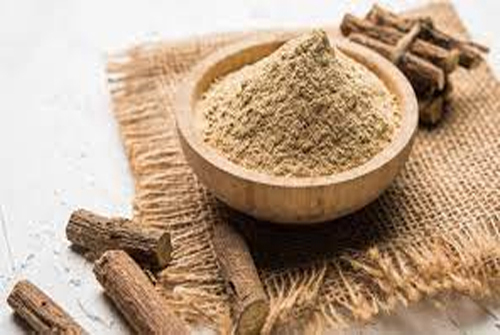Licorice
Posted on May 18th 2023

Licorice: Unveiling the Sweet and Beneficial Herb
When you hear the word "licorice," you may instantly think of the sweet and chewy candy that has delighted taste buds for generations. But did you know that licorice is also a powerful herb with a wide range of health benefits? With a rich history in traditional medicine and a unique flavor profile, licorice offers more than just a sweet treat. In this blog, we'll explore what licorice is, its potential health benefits, and how you can incorporate it into your daily routine.
Unraveling the Licorice Plant
Licorice, scientifically known as Glycyrrhiza glabra, is a perennial herb native to the Mediterranean and certain parts of Asia. It has been used for centuries in traditional Chinese, Ayurvedic, and Greek medicine for its medicinal properties. The root of the licorice plant contains glycyrrhizin, a compound responsible for its distinct flavor and potential health benefits.
Potential Health Benefits of Licorice
- Soothes Digestive Discomfort: Licorice has been traditionally used to support digestive health. It may help relieve symptoms of indigestion, including heartburn, acid reflux, and stomach ulcers. Licorice root contains compounds that can help soothe and protect the lining of the digestive tract.
- Supports Respiratory Health: Licorice has expectorant properties and can help alleviate symptoms of respiratory conditions such as coughs, colds, and bronchitis. It may help reduce mucus production and ease congestion, providing relief for respiratory discomfort.
- Balances Hormones: Licorice contains phytoestrogens, plant compounds that can mimic the effects of estrogen in the body. This makes licorice potentially beneficial for women experiencing hormonal imbalances, such as menopause symptoms or menstrual irregularities.
- Anti-inflammatory Effects: Licorice has been studied for its anti-inflammatory properties. It contains compounds that may help reduce inflammation in the body, which is associated with various chronic conditions, including arthritis and certain skin disorders.
- Supports Liver Health: Licorice has been traditionally used to support liver function and detoxification. It may help protect the liver against damage caused by toxins and oxidative stress.
Incorporating Licorice into Your Routine
- Licorice Tea: Enjoy licorice root as a tea by steeping it in hot water for a few minutes. This provides a soothing and naturally sweet herbal infusion that can be enjoyed on its own or combined with other herbal teas.
- Herbal Formulations: Licorice is a common ingredient in many herbal formulations and blends. Look for teas or supplements that include licorice alongside other complementary herbs for specific health goals.
- Natural Sweetener: Licorice root powder or extract can be used as a natural sweetener in cooking and baking. It adds a distinct sweet flavor and can be a healthier alternative to refined sugar in certain recipes.
- Licorice Supplements: If you're looking to harness the potential health benefits of licorice in a more concentrated form, licorice root supplements are available. However, it's important to consult with a healthcare professional before starting any supplementation.
Cautions and Considerations
While licorice offers many potential health benefits, it's important to use it in moderation and be mindful of a few considerations:
- Glycyrrhizin Content: Licorice root contains glycyrrhizin, which, in high doses or with prolonged use, can lead to high blood pressure and other health concerns. If you have high blood pressure, heart disease, or other medical conditions, it's best to consult with a healthcare professional before using licorice as a supplement or consuming it in large amounts.
- Interactions with Medications: Licorice may interact with certain medications, including blood pressure medications, diuretics, corticosteroids, and hormonal medications. If you are taking any medications, it's important to consult with your healthcare provider before incorporating licorice into your routine.
- Allergic Reactions: Some individuals may be allergic to licorice or have sensitivities to its compounds. If you experience any adverse reactions, such as itching, rash, or difficulty breathing, discontinue use and seek medical attention.
- Pregnancy and Nursing: Pregnant and breastfeeding women should exercise caution with licorice consumption. High doses or prolonged use may have adverse effects, and it's best to consult with a healthcare professional before use.
Conclusion
Licorice is more than just a candy flavor; it's a versatile and beneficial herb with potential health benefits. From soothing digestive discomfort to supporting respiratory health and balancing hormones, licorice has a long history of use in traditional medicine. Whether enjoyed as a tea, incorporated into herbal formulations, or used as a natural sweetener, licorice can be a delightful addition to your wellness routine.
However, it's important to use licorice in moderation, be aware of any potential interactions or allergies, and consult with a healthcare professional if you have any underlying medical conditions or are taking medications. With the right approach, licorice can be a sweet and supportive herb on your journey to overall well-being.
 Loading... Please wait...
Loading... Please wait...